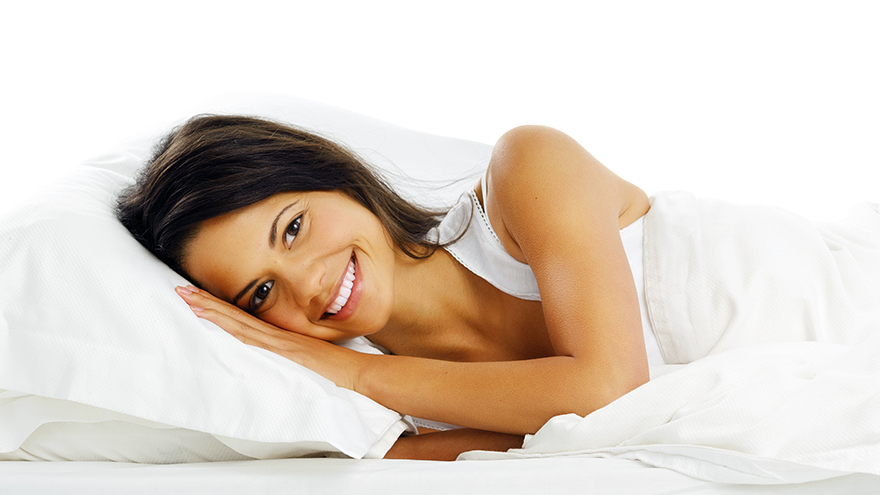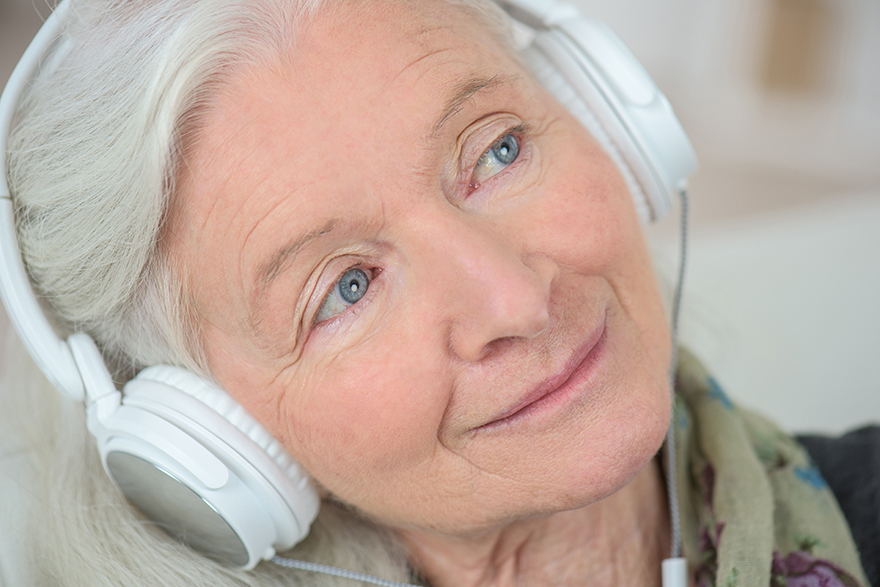Get Your B-E-D Right for a Good Night’s Sleep

Dame Helen Mirren extols the virtues of a good nights sleep as part of her secret to anti-ageing, but sadly for around 50 per cent of us sleep simply eludes us.
It has often been reported that as we get older we need less sleep and there are many potential reasons for this such as new medications, retirement, or simply the theory that the body needs less sleep as we age.
Sleep is when you secrete growth hormone and other factors involved in rejuvenation, repair and fighting disease. People who sleep for 7 to 8 hours have better immunity than those who are sleep deprived, and tend to live longer, too.
Our “racing minds” plus physical factors, such as the need to get up and go to the toilet, all keep us awake at night. Other influences including noise, our partner, light levels and room temperature are also on the list to keep us up counting sheep.
Sadly, poor sleep affects every aspect of our lives and it seems that women have a 10% lower average sleep score than men, yet energy, relationships and mood are the top three most affected areas for both men and women.
Getting the right amount of sleep is vital for our well-being. Restless sleep patterns, or not getting enough sleep, can eventually hinder our daily lives.
So how can you get your sleep back on track?
Dr. Craig Hudson is a practicing psychiatrist with an extensive background in brain research and has created the BED Checklist which is broken down into three parts: Behaviour — Environment — Diet.
Changing your Behaviour
Maintain a regular sleep-wake time. Go to bed at the same time and wake up at the same time. Try not to lie in or stay up too late. If you had a bad night last night, don’t get into bed at 8pm thinking you will catch up. It doesn’t work that way.
Don’t nap during the day. Avoid napping during the day to “catch up” as this only serves to steal deeper sleep you will need for the night.
Don’t exercise before bed. Exercise is really important for healthy living and healthy sleeping. Just don’t do any aerobic exercise in the evening before bed. Gentle yoga style or stretching is fine as aerobic exercise will energise you.
Plan a relaxation period before bed. Give yourself at least 20 minutes of down time before bed. De-activate your mind, listen to some music, curl up on a couch, flip through a magazine. It is very important to create a division between the stress of your day and your sleep time. Television or reading may provide this for some people but if you have insomnia, even these may be too stimulating.
Only go to bed when tired. Your relaxation time should trigger sleepiness. Wait until you feel sleepy before heading to bed. It does more harm, as you will see, to be spending a lot of time awake in bed.
Don’t clock watch. Make sure your alarm is working and then turn the clock to the wall or cover it with something. Looking at the clock and counting your awakenings makes you more vigilant and anxious. The extra light coming from a digital display will also affect melatonin production.
Use the bed for sleep alone. With the obvious exception of sex, refrain from any other activity in bed. The bedroom area should be an oasis of sleep and you must come to associate the bed as a place for sleep, not activity and wakefulness.
If you wake in the middle of the night get out of bed. Tossing and turning leads to associating your bed with being awake and frustrated. Changing your behaviour can help train your brain for sleepiness if you come to associate the bed with sleeping. Associate wakefulness with a chair that you place by your bed and sit in it when you are awake.
Get back into bed when you feel sleepy again. Don’t fall asleep in that chair! As soon as you start to feel sleepy again, climb back into bed. It is most important that you reinforce to your brain that when you are lying in your bed, you are ready for sleep.
Changing your Environment
Block the light out of the bedroom. Natural sleep results from the brain producing natural melatonin. This process is hampered by the presence of light. You need as much melatonin as you are able to produce so keeping the room as dark as possible will help you sleep. Buy black-out blinds, curtains or wear a good sleep mask.
Block any noise. Similarly, if you are distracted by noises in your environment, wear earplugs to reduce extra stimulation.
Keep a regular temperature. Your body temperature will fluctuate at night. Keep your room a cool 21°C so that you are not disturbed by these changes.
Remove any physical distractions. A television, computer or other devices draw your attention away from the bedroom task which is sleep. These devices pull your concentration to worries and focuses that are better left to daytime when you may attend to them properly. Physically and mentally, you must make a division between your day and night activity.
Changing your Diet
Avoid alcohol as a sleep aid. Many people believe that alcohol helps with sleep. While it does cause some people to feel sleepy, it actually serves to cause more night-time wakefulness. Alcohol fractures sleep and interrupts the normal flow of sleep stages.
Watch your caffeine intake. If you are serious about your sleep problem, do not indulge in caffeinated beverages or foods in the afternoon. That goes for tea, coffee, colas, energy drinks and chocolate. There are hidden sources of caffeine as well. Some clear sodas contain caffeine so read the label.
Avoid protein 3 hours before bed. Natural melatonin production, necessary for healthy sleep, results from sufficient intake of high tryptophan foods such as milk, dairy, turkey, meats, nuts, eggs, legumes, pumpkin and sesame seeds. These are better consumed earlier in the day so that the available tryptophan in your system is not overpowered by the other amino acids.
Increase carbohydrates before bed. Carbs naturally act to shunt the tryptophan you took in earlier in the day to the right place in your brain responsible for turning it into natural melatonin. Examples of High Glycemic Carbohydrates are white or grain bread, cereals, crackers, rice, couscous, pasta, biscuits (avoid chocolate), potatoes, carrots.
Natural products to help aid sleep
Dick Middleton, pharmacist and Chair of the British Herbal Medicine Association (www.bhma.info) says:
The herb Passion Flower has been used traditionally for many years to relieve symptoms of stress and anxiety. It is particularly helpful as a calming herb and is often used, either on its own or in combination with other herbs such as Valerian, to help relieve stress induced insomnia. More information about herbs for minor health conditions can be found on the BHMA website.”
- Valerian is recognised as a mild sedative that calms the nervous system, lowers levels of anxiety and promotes relaxation and sleep. Canadian scientists studied nearly 200 patients and found that including a valerian hops supplement in a diet could help people who suffer from mild insomnia. Try Dormeasan® Sleep Valerian-Hops Oral Drops.
- Zenbev Natural Drink Formula (www.zenbev.co.uk) is an organic sleep aid made from pumpkin seeds. The organic pumpkin seeds are cold pressed to remove the oil and blended in a powder formulation that promotes sleep naturally. Zenbev is clinically proven to promote a natural and healthy sleep.
- Healthspan Night-Time 5-HTP (00mg of natural 5-HTP and 187mg of Magnesium) provides building blocks for making melatonin, your natural sleep hormone. Depression, or symptoms of this condition, could impact on a good night’s sleep, but restoring the body’s levels of serotonin, also known as the happy hormone, may help.
- As well as it’s role to support the immune system, Rob Hobson, Healthspan Head of Nutrition recommends that we have good levels of magnesium in our diet which can be found in leafy green vegetables plus wheat bran and eating almonds. A significant number of women have low intake of this mineral so taking it as a supplement could help replenish the body’s supply.
- Melatonin is a naturally occurring hormone which is released in cycles throughout the day. Found in cherries, bananas and grapes, it keeps us alert during the day and at rest during the night – in effect it regulates our normal sleep/wake cycle. However, many people don’t have high enough levels of melatonin at night, so taking it in supplement form could help us get to sleep. Studies have also shown melatonin deficiency may play an important role in the high frequency of insomnia among elderly people.
- Making sure you have a good balanced diet, eating breakfast, getting enough protein and not too much alcohol or caffeine are all key to a good nights sleep.
Download this PDF called One Week To Better Sleep here that has been written by Dr Craig Hudson.
What are your sleep tips? Share them with us!
Tell us your thoughts, suggestions, tips and cures for insomnia, for the next My Weekly Special.
Email myweekly@dcthomson.co.uk, with the subject How I Get To Sleep. Can’t wait to read them!





